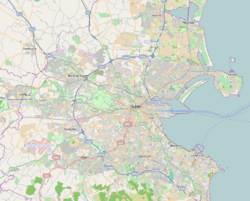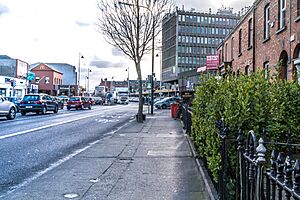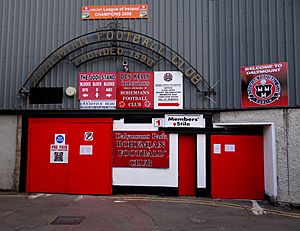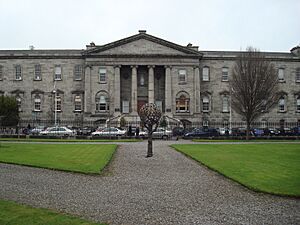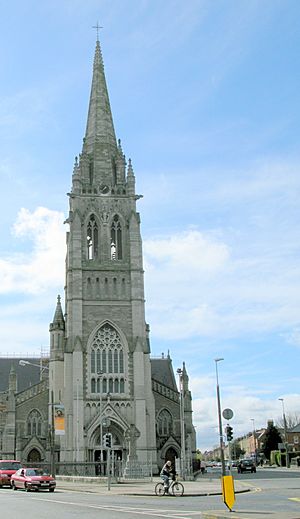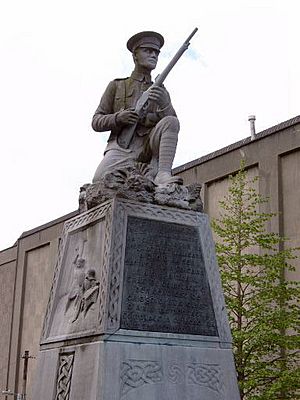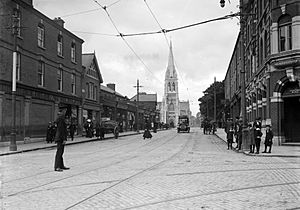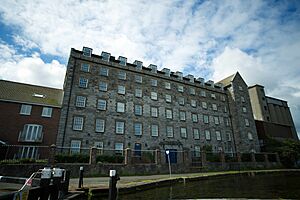Phibsborough facts for kids
Quick facts for kids
Phibsborough
Baile Phib
|
|
|---|---|
|
Inner suburb
|
|
| Country | Ireland |
| Province | Leinster |
| City | Dublin |
| Dáil Éireann | Dublin Central |
| European Parliament | Dublin |
| Elevation | 49 m (161 ft) |
| Irish Grid Reference | O055383 |
Phibsborough (pronounced "fibz-buh-ruh"), also spelled Phibsboro, is a busy neighbourhood in the north part of Dublin, Ireland. It has both shops and homes.
The Bradogue River flows through the area, but it's hidden underground. The Royal Canal also runs through the northern part of Phibsborough, especially near Cross Guns Bridge. Long ago, a part of the canal went to the Broadstone area, which later became a train station. Today, it's the main office for Bus Éireann, a bus company. Mountjoy Prison is also located in this district.
Contents
What's in a Name?
The name "Phibsborough" comes from "Phipps" or "Phibbs." People believe it's linked to Richard Phibbs, a settler from Lincolnshire who lived in Kilmainham in the mid-1600s. In 1792, the name was spelled "Phippsborough."
Where is Phibsborough?
Phibsborough is about 2 kilometres (1.2 miles) north of Dublin's old city centre. It's in Dublin 7.
It shares borders with:
- Glasnevin to the north
- Drumcondra to the east
- Grangegorman and Cabra to the west
- The King's Inns to the south
The main shopping area of Phibsborough is around the crossroads of Phibsborough Road and North Circular Road. This spot is often called Doyle's Corner.
Getting Around Phibsborough
Bus Services
Many Dublin Bus routes serve Phibsborough. These buses travel to the northern suburbs of the city. Some of the routes include numbers 4, 9, 38, 38a, 38b, 38d, 46a, 70n, 83, 83a, 88n, 120, 122, 140, and 155. Buses also travel from Phibsborough into the city centre.
Luas Tram Line
Phibsborough, Grangegorman, and Broadstone all have stops on the Luas Green Line. This tram line follows an old railway route.
- The Phibsborough stop is located between the North Circular Road and the Cabra Road. You can reach the platforms from both roads using stairs and lifts. This stop helps people living nearby and lets them change to bus services.
- The Broadstone stop is near Prebend Street. It serves the Mountjoy area and the new Technological University Dublin campus in Grangegorman.
The Luas Cross City project connected the Luas Red and Green lines. This new line runs from Broombridge in North Dublin to St. Stephen's Green. Services started in December 2017.
Places to Visit and Things to Do
The Royal Canal forms the northern border of Phibsborough, separating it from Glasnevin. A part of the canal that used to go to the city markets is now a linear park. The road next to it is called Royal Canal Bank. This area has many different types of homes, some built as far back as the 1750s. The canal's main path now goes southeast to Spencer Dock.
The Blessington Street Basin used to provide water to the city and to famous distilleries. It's now a public park and a peaceful place for wildlife.
Dalymount Park is the home stadium of League of Ireland team Bohemian F.C.. Before the Aviva Stadium was built, it was where international football matches were played. The famous 'Dalymount Roar' was a cheer created here by fans. The National Botanic Gardens are also nearby in Glasnevin.
For sports, Phibsboro Boxing Club has a gym on Royal Canal Bank. The Phibsboro Chess Club meets at Clareville Community Centre.
Phibsborough is also home to major hospitals:
- The Mater Misericordiae University Hospital is a large teaching hospital.
- Next to it is the Mater Private Hospital.
- Temple Street Children's Hospital is also nearby.
Churches in Phibsborough
Phibsborough has several churches:
- The Church of St Peter serves the local Catholic parish.
- All Saints Parish Church (Church of Ireland) is on Phibsborough Road.
- In 2017, the Romanian Orthodox Church opened its new church on Western Way.
A Look Back at Phibsborough's History
Early Days
The original Irish name for the area was Glas Mochonóg, meaning Monck's Green. This name changed over time. The Green was a playfield and parade ground, crossed by the main road from Dublin. The area, especially between the Broadstone and the village of Baile Phib, often flooded and became muddy.
The name Phibsborough comes from the Phipps or Phibbs family, who were landowners here in the mid-1600s.
Growing Up
The Broadstone area grew a lot in the early 1800s. This was to support the Royal Canal Company's headquarters and harbour. Later, the Midland Great Western Railway brought more development, especially around the North Circular Road. As Dublin expanded, homes were built further north, reaching Phibsborough, Glasnevin, and Phoenix Park.
A Church of Ireland church was built in 1828. St. Peter's Catholic Church and schools were built starting in 1862. All Saints Church of Ireland Parish Church was finished in 1904.
The 20th Century
In 1900, a Baptist church was built on the North Circular Road. It was later sold and turned into offices.
During the Easter Rising in 1916, the family of Éamon de Valera, who later became a leader of Ireland, lived in Phibsborough. There are memorials in Phibsborough, including one for Sean Healy, a 15-year-old who died during the Rising.
Many people from Phibsborough were involved in the Irish War of Independence. Harry Boland and Dick McKee, both important figures, were born and grew up here. Bernard Ryan, one of "The Forgotten Ten" (people executed during the War of Independence), also lived here. A sculpture by Leo Broe remembers the local members of the Irish Volunteers.
Broadstone Station closed in 1937. These buildings, which were once the main train station and offices for the Midland Great Western Railway and Royal Canal Company, are now used by Bus Éireann and Dublin Bus. The impressive old building from the 1800s is waiting to be redeveloped as part of a plan to improve the area.
Phibsborough also had a flour mill. It was originally an iron mill before becoming the North City Flour Mill in the 1860s. It closed in 1983 and is now apartments.
The famous author James Joyce and his family lived at No. 7, St. Peter's Road for a time. He even mentioned Phibsborough in his famous book, Ulysses:
In silence they drove along Phibsborough Road. An empty hearse trotted by, coming from the cemetery: looks relieved.
Crossguns bridge: the Royal canal.
Water rushed roaring through the sluices. A man stood on his dropping barge, between clamps of turf. On the towpath by the lock a slacktethered horse.
Aboard of the Bugabu.
Recent Times
After World War II, Phibsborough became a popular place for people working in Dublin's city centre to live. Many large homes were turned into flats. More recently, some of these historic properties have been changed back into family homes or modern apartments. Many beautiful Victorian and Edwardian buildings have been restored. The area also has several old Victorian-era pubs.
The Phibsboro Shopping Centre, built in 1969, is one of the largest buildings in the area. It was the first building in Ireland to combine a shopping centre with offices. It has been a topic of discussion due to its design and how it was approved.
Dalymount Park, the home of Bohemian FC, is on the west side of the shopping centre. The club, known as 'Bohs', started in 1890. In 2016, plans were announced to improve the stadium and make it more accessible.
Arts, Music, and Media
The first Phibsborough community arts festival, Phizzfest, happened in September 2010. Writers like Anne Enright and Dermot Bolger took part.
Phibsborough used to have two early cinemas:
- The Bohemian Picture Theatre (also called Palace) operated from 1914 to 1974. It was later taken down.
- The Phibsborough Picture House opened in May 1914. It was later rebuilt and became the State cinema in 1953. It was one of the first cinemas designed to show CinemaScope films. The building is now used for other purposes, but its outside still looks much the same.
Old photographs of the streets around the North Circular Road and Phibsborough Road crossroads are available online. They show important parts of the area's history.
Famous People from Phibsborough
Many notable people have connections to Phibsborough:
- Cecil Frances Alexander, who wrote hymns, was born on Eccles Street.
- Ernest Blythe, an Irish Minister for Finance.
- Seóirse Bodley, a composer.
- Harry Boland, a revolutionary and member of the First Dáil (Irish parliament).
- Desmond Connell, a Cardinal Archbishop of Dublin.
- Michael Gambon, a well-known actor.
- Philip Greene, an RTÉ sports broadcaster.
- James Joyce, the famous author, lived at 5 St. Peter's Road.
- Cathal Mac Coille, an RTÉ journalist.
- Dick McKee, a republican revolutionary.
- Iris Murdoch, an author and philosopher, born on Blessington Street.
- Bernard Ryan, a republican revolutionary.
- Éamon de Valera, a former Taoiseach (Prime Minister) and President of Ireland.
See also
 In Spanish: Phibsborough para niños
In Spanish: Phibsborough para niños
 | Precious Adams |
 | Lauren Anderson |
 | Janet Collins |


